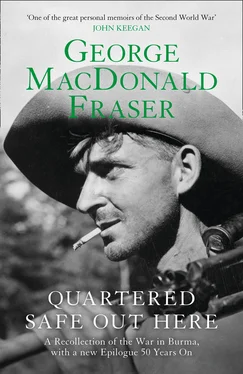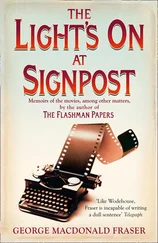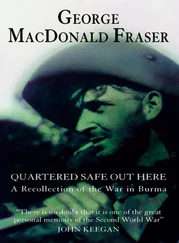I said my parents had wanted me to be a doctor, and he gave me a hard stare.
“You didn’t make it? Why not?”
“Not clever enough, I suppose. Didn’t get into university.”
“Too bloody lazy, more like. Idle little sod.”
“Well, I didn’t want to be a doctor! I wanted to get into the Army, try for a commission.”
“Did you, now? Stupid git. Well, ’ave you applied?”
“Yep. Selection board turned me down. I’ve been busted from lance-jack a couple of times, too.”
“Christ, some mothers don’t ’alf ’ave ’em! An educated sod like you – I seen you doin’ bleedin’ crosswords.” He cackled and shook his head. “Well, I shall just ’ave to kick you up the arse, young Jock, I can see that. Ne’ mind – with my permish you’ll get a commish!” He liked the sound of that, and it became a private slogan whenever the going got uncomfortable: if I was sodden through, or was marching on my chinstrap, as the saying was, or bone-tired after digging or standing to all night, and even when we went in under the guns at Pyawbwe, Parker’s raucous cry would be heard: “Bash on, Jock – wiv my permish you’ll get a commish!” It was as regular as Nick’s “You’ll all get killed!” and just about as encouraging.
That was the section, and if they sound like a typical cast for a Gainsborough war movie, and I am suspected of having used clichés of character, I cannot help it. Every word about them is as true as I can make it. War is like that, full of clichés, and of many incidents and speeches that you couldn’t get away with in fiction. Later I shall describe how a comrade of mine, on being shot in the leg, rolled on the ground shouting: “They got me! The dirty rats, they got me!” I would not use it in a screenplay – and I know what the director and actor would say if I did. But it happened, word for word, nature imitating art.
I have said that was the section, but obviously it changed. We took casualties, and new men came in, and some of them became casualties, and reorganisations took place, often in haste during an action – I suppose as many as twenty men, perhaps even more, served in the section in six months, but the nine I have described are the ones I remember best. Eventually I left the section, and found myself in the last stages of the war among unfamiliar faces. But up to Meiktila we were all together, and whatever I learned I learned from them.
Because I dislike books which bewilder me by taking for granted technical details which I don’t know, and also for the record, I shall say how we were dressed and armed. Burma was a barebones war; in many ways we were like soldiers of the last century in that our arms and equipment were of the simplest; it was so because it was largely a close-contact, hand-to-hand war in which, while tanks and aircraft and artillery played an important part, it was first and foremost an infantryman’s business, and actions tended to be on a small scale compared with the battles in Europe. By today’s standards we were sparsely equipped. Thank God.
The uniform was all dark green; even underpants, vests, and socks had gone into the big dye vat at Ranchi; watch-straps had to be green or khaki. You had two shirts, two pairs of trousers, puttees (a better protection than anklets against leeches and other crawlies), and boots – British-made, if you were lucky, rather than the clumsier Indian pattern; later we sometimes wore captured Jap jungle boots, with their thick crepe soles. A few – Parker, for one – dispensed with socks and filled their boots with tallow, claiming that it prevented blisters. It was also messy, and stank. I tried it – once.
Fourteenth Army’s distinguishing feature was the bush-hat, that magnificent Australian headgear with the rakish broad brim which shielded against rain and sun and was ideal for scooping water out of wells. In some ways it was a freak, in the steel-helmeted twentieth century, and it may have cost some lives under shell-fire, but we wouldn’t have swapped it. It looked good, it felt good; if you’d been able to boil water in it you wouldn’t have needed a hotel. Everyone carried a razor-blade tucked into the band, in case you were captured, in which event you might, presumably, cut your bonds, or decapitate your jailer by stages, or if the worst came to the worst and you were interrogated by Marshal Tojo in person, present a smart and soldierly appearance.
Equipment consisted of the standard web belt; cross-braces; pouches worn brassière fashion; small pack containing two mess-tins, pialla (enamelled mug), knife, fork, and spoon, housewife with needle and thread, water purification pills, mepacrin (to ward off malaria, which it didn’t), and any personal effects you felt like carrying, plus your rations; a pint water-bottle; entrenching tool, a steel mattock head with a detachable handle; and a log-line, a five-yard coil of thin rope. The last three items hung from the belt behind. A small trouser pocket contained a field dressing, but everyone scrounged a spare one because the gauze made a splendid sweat-rag-cum-neckerchief.
Weaponry was equally simple. There were a few tommy guns (but none of the hated Stens, the plumber’s nightmare) in the company, but the standard arm was the most beautiful firearm ever invented, the famous short Lee Enfield, either of the old pattern with the flat backsight and long sword bayonet, or the Mark IV with the pig-sticker, a nine-inch spike with no cutting edge. The old pattern, which I carried, was the great rifle of the First World War, which the Old Contemptibles used with such speed and skill that the enemy often believed they were facing automatic weapons, and one German general told of how his division had been “shot flat” by its disciplined fire. It held ten rounds with its magazine charged, and another up the spout, had an extreme range of close to a mile, and in capable hands was deadly accurate up to four hundred yards. I’m no Davy Crockett, but I could hit three falling plates (about ten inches square) out of five at two hundred, and I was graded only a first-class shot, not a marksman. The Lee Enfield, cased in wood from butt to muzzle, could stand up to any rough treatment, and it never jammed. “She’s your wife,” as the musketry instructors used to say. “Treat her right and she’ll give you full satisfaction.” And she did, thirty years old as she was; treating her right consisted of keeping her “clean, bright, and slightly oiled” with the pullthrough and oil bottle in her butt trap, and boiling her out after heavy firing. She’s a museum piece now, but I see her still on T.V. newsreels, in the hands of hairy, outlandish men like the Mujahedeen of Afghanistan and capable-looking gentry in North Africa, and I have a feeling that she will be loosing off her ten rounds rapid when the Kalashnikovs and Armalites are forgotten. That’s the old reactionary talking: no doubt Agincourt die-hards said the same of the long bow.
Nowadays the automatic rifle, and concentrated firepower, are the thing, spraying rounds all over the place – which must give rise to hideous supply problems, I imagine. We had it drummed into us that each round cost threepence; “one bullet, one Jap” was proverbial, if obviously impractical. I know I sound like a dinosaur, but I doubt if the standard of marksmanship is what it was – it can’t be, except at short range – and I wonder what happens if, say, a bridge has to be blown from a distance, because there’s no fuse, and someone has to hit a gun-cotton primer the size of a 10p piece at two hundred yards? (A Sapper lieutenant did that in Burma, with a Lee Enfield, one shot.) Possibly such problems don’t arise in modern high-tech war, or perhaps they just plaster the bloody thing with automatic fire, and hope. But I digress. We carried fifty round apiece, in a canvas bandolier draped over the buttocks.
Читать дальше












